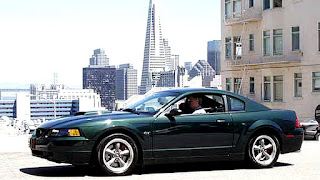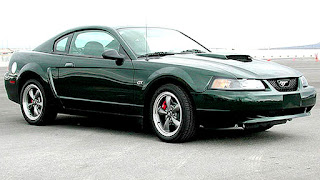Fastest Ford Mustangs Part 4 : 2001 Mustang Bullitt
Fastest Ford Mustangs Part 4 : 2001 Mustang Bullitt
When it comes to the Bullitt Mustang GT, we must admit that
in muscle Mustangs feel a bit silly. When we learned the details of this car -
lowered suspension, front brakes Cobra, Ford Racing intake, underdrive pulleys,
etc., we realized that it was a must, great house Slam run.Then saw in person
he went crazy. Admittedly, we praise the heck out of it in these pages before
they ever even sat in one. His style was improved, the interior was a lovely
memory and performance and management promised to be the best in the world for
a GT.
Then reality reared its ugly head. When the news that
changed the 4.6 SOHC V8 Bullitt met did a little five horsepower more than the
original and three - count 'em three - more lbs.-ft. of torque, we feel cheated.
Based on your letters and emails, so many of you. The primary question you
asked was: "Is Bullitt still worth the extra money?"
If you are going to base your purchasing decision only in
times of a quarter mile, performance or qualifications DynoJet factory, we
would say no. But there is more to this Bullitt. A wise old man once said, you
can not judge a performance car only in numbers and in this case was correct.
You still get a lot for your $ 3,695. It is so disappointing that while Chevy
being built (at least for next year) 12-second Camaros (see box), the Ford
powertrain engineers are apparently working on something else.
On paper, the Bullitt engine gets more power per cubic inch
(0.943 vs. 0.939) that SS version, but not run on paper right? In the real
world of Camaro Z / 28 and SS drew well over 310 (Z / 28) and 325 (SS) rated
power; Chevy mill is 65 cubic inches larger, which obviously puts the Bullitt
and horses less than 260 GT at an extreme disadvantage. This raises more
questions: Can not do any better with the mod Ford engine under the addition of
a supercharger to it? Is this all there is? Dearborn Do kids have to go
shopping for spare LS1s general when F-body twins no longer exist so the
Mustang may have some oatmeal?
Before you leave the tar and feathers, know this: Except for
acceleration-balls to the wall, the Bullitt is by far the best GT ever. The
management is flatter, better style and shorter braking any non-Cobra has gone
before. The interior is totally cool and Team Mustang obviously sweat the
details with aluminum trim, red rotors, etc. It's just disappointing when
aluminum intake Ford Ford Racing Parts, underdrive pulleys, freer flowing
exhaust is added (20 percent better than the standard GT) and a larger throttle
body (57mm double vs. 65) and comes five horsepower. It seems even worse when
you realize that 2-valve 4.6 this year has almost half a point over 2000
compression, 9.4: 1 vs. 9.0: 1.
Enough of this - why did you like about the car? Most. Let's
start with the simplest element, color. Dark Highland Green is deep with a lot
of metal in it, not to mention true to the spirit of '68 color film car. It's
just pretty darn. Those with black and blue Bullitts certainly agree, but we
would have been perfectly content if Dark Highland Green was the only shade
available.
The redesign of the area C-scoop ahead of the rear wheels is
a great improvement over the base GT too. By Bullitt, non-functional scoop,
supplanted by a piece of molding that goes back again to 68 Stang is removed. A
very good job of smoothing this area of the body is made.
The air intake imitation, which comes in all GTs, received
mixed reviews from our staff. Tech editor Evan Smith loved because it made him
feel as if he were driving an old musclecar, others felt that seemed out of
place and tacked to a design otherwise clean. The 17-inch wheels-Torq Thrust
D-inspired drew rave reviews everywhere. Like the original, probably they never
go out of style and they fit perfectly chiseled body Mustang. The gas filler door
aluminum adds some brilliant work in the rear, while the output dark horse
emblem barnyard running around the nose takes it away. The only external logo
Bullitt is on the trunk lid, right on the left taillight.
Off road, the Bullitt gets more than its share of approving
glances. Production cars just go out when we got our tester and everyone seemed
to know what it was.
Another area where the Mustang team, who headed out of the
park is inside. The seats are very similar to those used in the Cobra, except
that they are fully made of leather (no fabric inserts) and lack the serpentine
logo. The covers are perforated, have 60s-style folds and do a better job than
the average of you holds it in place. They are also a heckuva lot more
comfortable than regular GT chairs. The inspiration tachometer and speedo
Mustang '67 -68 look the part as well, although that would be much easier to
read if they were a little bigger or had both English and metric readings. As
they sit, sometimes they are too busy to read at a glance.
Aluminum trim around the shift boot has a thumbs up and
aluminum shifter has a thumbs down (too small, too hot in summer days). On the
other hand, the aluminum pedal covers (repositioned for better driving heel and
toe) got two thumbs up, like plates doorway metal.
Drive the Bullitt is what makes the car special, however.
Revalved the Tokico shocks, Tokico struts and springs give the car is not only
improved ride height, but sharpness Missing GT. The thicker and thinner front
stabilizer bar rear bar could have been used to build more thrust (for
security) for extra power anticipated that never materialized. We had the car
enough to wring completely, and although the trip is definitely firmer than the
GT, which is not to the point of annoyance. It actually feels like the GT
should have years ago.
Another area addressed in the Bullitt that has been greatly
improved is the clutch. A new 11-inch wheel and the clutch assembly are used.
It is much lighter than the original, so that power move easier and just
sitting in traffic much less stressful. As a bonus, which has a higher torque
capacity.
On the track, Smith powershifted your way to a series of
13.90s. The best he could do during our tests humid summer session was 13.91 to
98.5 mph. 60-ft. time on tires Stock 2.09s were consistent - not bad
considering the weather. Originally blame these times when the heat and excess
weight.
According to the scale at Raceway Park, the car weighs 3.900
pounds. We found it inconceivable, but when Smith himself weighed the scale was
accurate. The next time we went to the track, however, we realized that the
scale was off when a test car weighed less with the driver in it than without
it.
We are assuming that in fact the Bullitt weighs about 3600
with driver. We also know people who are going 13.7s with Bullitts production
Goodyears decent air, so it's not like the car is slow.
By DynoJet in Crazy Horse Racing in Clark, New Jersey, the
Bullitt spinning the reels of 236.8 horsepower and 279.8 lbs.-ft. of torque.
The torque curve is fairly flat and you can feel the power in the street. But
compare test sheet of the Bullitt to a newspaper 2001 GT tested in Crazy Horse
(also shown). That was social with the exception of a system cat-back exhaust
aftermarket. The GT had more power and torque. Ugh.
So, when all is said and done, is the Bullitt worth the kind
of mass brings its suggested price of $ 27.380? Even with its flaws, we say
yes. As Art Hyde, Mustang team leader told us: "There is much love in this
car."
The men and women behind him in Ford put in a great effort
to create a truly desirable special edition. Unlike previous attempts that were
for the most tape strips and ornaments blackout, this limited edition Mustang
had some genuine engineering and thought put into it. Too bad actions do not go
under the hood and the rest of it.
To put it in baseball terms, we think the Bullitt would be a
winning game, grand slam home run. What they got was more like a double. It is
highly desirable, but there is more work to do.
Hopefully, the Mach 1 will receive the green light from Ford
and drive in the winning runs.








Comments
Post a Comment